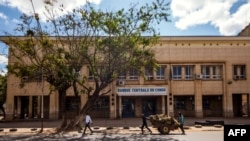Business and banking dealings by North Koreans in the Democratic Republic of the Congo appear to violate numerous international sanctions, according to watchdog groups who say Pyongyang is taking advantage of the DRC’s lax bank system.
A report in August by Sentry, a Washington D.C.-based organization that tracks money which finances conflict in Africa found that in 2018 two North Korean businessmen traveled to the DRC on non-commercial visas, set up a construction firm, opened a bank account and were awarded contracts for numerous projects including building government-funded statues.
Investigators say the report shows that North Korea is seeking out parts of the world where it can operate secretly and obtain foreign currency otherwise unavailable to the secretive and internationally-isolated government.
“All of these different steps are important because that entire process is littered with a number of violations of U.N., E.U. and U.S. sanctions,” John Dell’Osso, senior investigator for Sentry told VOA. “And those sanctions specifically focus on preventing just the kind of activity we wrote about which is North Koreans setting up businesses, which would give them an opportunity to generate revenue and then allowing them to set up bank accounts that would enable them to transact in foreign currencies which are critical to the government in Pyongyang.”
Jean-Louis Kayembe wa Kayembe, director general at the DRC central bank and head of the monetary policy committee, declined comment when contacted by VOA. North Korean officials have not commented on the Sentry allegations or business dealings in the DRC.
The Sentry report says that upon arrival in the DRC, the men - Pak Hwa Song and Hwang Kil Su - established relationships with elected officials from the People's Party for Reconstruction and Democracy, the former ruling party headed by ex-president Joseph Kabila.
Among the projects undertaken by the North Koreans was building a statue of Kabila’s father, ex-president Laurent Kabila in the southern city of Kamina. Another statute they built in the city depicts a leader from the Luba ethnic group.
Dell’Osso said the opacity of the contracts makes it impossible to know exactly how much the men were paid, but he said similar statues can cost hundreds of thousands of dollars. He also said it is unproven whether DRC officials knew they were breaking the law by doing business with North Koreans, but the general leniency in the country reveals major problems.
“This wasn't just a single foul-up, if you want to call it that. There was a series of foul-ups that enabled this activity to take place,” Dell’Osso said. “So even if the money had been small, we know that the North Koreans desperately try to get foreign currency and liquid funds that they can move back to Pyongyang. But the bigger question is what else might be going on here in the country and in what is the level of enforcement of sanctions overall in the DRC?”
In a recent event held by the Atlantic Council, Congolese banking system expert Floribert Anzuluni, the co-founder and coordinator of the FILIMBI for Citizens Movement, said the country is particularly vulnerable to this type of activity.
“I'm not surprised by the content of the report,” Anzuluni said. “Clearly a systemic problem. It's the consequences of this systemic problem that the country is facing, which includes bad governance and, of course, corruption.”
Anzuluni said the DRC is one of the only countries in the world without a national identification system. Therefore, its banks are accustomed to taking alternate forms of ID, making it easy for foreigners to open accounts without scrutiny.
“If you cannot identify persons, how could you be able to identify the businesses that are run by a person?” Anzuluni asked. “So, the DRC is also one of the, let's say the few countries, where a non-resident can open and hold an account without a rigorous control. So, the central bank is the one responsible for the situation.”
Since a large percentage of business in the DRC is conducted in foreign currency, the country relies on relationships with international banks to keep its economy moving.
“If the DRC were deprived of U.S. dollars -- we're not just talking about large mining companies that all of the sudden are facing a crisis, we're talking about everyday people who are directly affected or indirectly affected,” Dell'Oss said. “And that would be catastrophic, particularly in a country that's facing a lot of economic hardship right now.”




